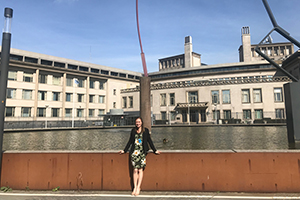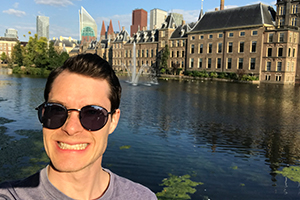INTERNATIONAL JUSTICE PROGRAM OFFERS SIGNIFICANT EXPOSURE TO INTERNATIONAL CRIMINAL LAW
February 5, 2019 — Many lawyers dream of one day working on a high-profile international criminal case. For two Penn State Dickinson Law students, that dream became reality last fall. Third-year Dickinson Law students Malcolm McDermond and Olivia Phillips completed internships at the United Nations International Residual Mechanism for Criminal Tribunals (IRMCT) in The Hague, The Netherlands, as part of the Law School’s International Justice Program.
“This semester-long program offers second- and third-year Dickinson Law students the opportunity to gain legal experience in a global setting,” said Professor of Law and International Justice Program Advisor Dermot Groome, a former senior trial attorney at the Office of the Prosecutor for the International Criminal Tribunal for the former Yugoslavia. “Students work alongside senior prosecutors and participate in some of the most significant international criminal cases being prosecuted today.”

Phillips worked on one of those high-profile cases during her time at the IRMCT, which maintains the legacy of the International Criminal Tribunal for Rwanda and the International Criminal Tribunal for the former Yugoslavia, and strives to reflect best practices in the international criminal justice field. She reviewed judgements and helped draft the Response Brief in the appeal of General Ratko Mladić, The Prosecutor v. Ratko Mladić—a case led by Groome, in which judgement was rendered in November 2017 following a more than five-year trial. Mladić was the commander of the Army of Republika Srpska and was sentenced to life imprisonment for the 1995 Srebrenica massacre of over 7,000 Muslim men and boys; for leading the nearly four-year siege of Sarajevo, in which thousands were killed; and for the ethnic cleansing of non-Serbs from large areas of Bosnia and Herzegovina.
For Phillips, working at the IRMCT was a once in a lifetime opportunity. “I thought I wanted to work internationally because I came to Dickinson Law as a single woman ready to take over the world. That, in addition to the criminal aspect, which was of interest to me, and being able to prosecute people who've committed horrific crimes were appealing to me, even though normally I'm not very prosecutorial-in-nature.”
McDermond spent his time reviewing large amounts of evidence for The Prosecutor v. Stanišić and Simatović, a case involving former chief of the Serbian State Security Service Stanišić and his assistant Simatović, who were charged with committing crimes against Croats and Muslims during the wars in Croatia, Bosnia, and Herzegovina.
“I analyzed evidence and read testimony from witnesses and tried to distill it down as best as possible to ensure everything the Prosecution was tendering was correct,” said McDermond. “While it felt repetitive at times, I found it very interesting to work with that kind of evidence, and I understood how critical my work was to the case.”

McDermond was drawn to the International Justice Program after living abroad in Thailand and Nepal. “What I saw while there was a real need for rule-of-law and how supporting strong international law and legal institutions is important around the world, as well as here in the United States. This program is one of the ways in which you can be involved in a pretty substantive and effective part of international law, and that is the criminal tribunal itself.”
In addition to receiving hands-on instruction in international criminal law, students are exposed to different legal cultures. They learn how to manage large, complex trials, as well as alternative approaches to the introduction of trial evidence.
“Studying abroad helps broaden your world view,” said Phillips. “Even in law school, that much is true. There is a lot that you don't know as an undergrad that you learn once you get to law school. During law school, you find that there’s even more you don’t know. I wasn’t always interested in criminal law; it found me.”
Both students say the experiences they had abroad have helped them better understand their career options and determine if they want to practice international criminal law.
“My work experience with the IRMCT gave me a clear understanding of how to break into the international legal field,” said McDermond. “Before, I really had no idea what my career path might look like if I wanted to end up in international criminal law or practice international law generally. Seeing how others went about getting their contracts and realizing that sometimes you have to take some risks have helped me determine when working internationally might be best for me. That's really helped me come to terms with not practicing abroad immediately, but rather focusing on developing my practice and my own professional skills here first.”
Both students praise Dickinson Law’s model of trial by fire, treating its incoming law students as lawyers from day one. “Interviewing our first client during our first few days of law school forced us to talk to and interact with people like an attorney,” said Phillips. “Having that experience very early on allows you to actually feel like an attorney even though you’re an intern.”
“Dickinson Law emphasizes that we are professionals from the get-go,” said McDermond. “When that's been instilled in you for a year or two before you go abroad, you really do recognize that you are going to have to show your professionalism from the day you arrive throughout your entire work experience.”
McDermond feels blessed to have had this opportunity. “The work environment, the attorneys, and my fellow interns; they were absolutely amazing to work with. I couldn’t have asked to be part of a better team.”
“When I take a step back and really think about the experience I had, I realize how lucky I am,” said Phillips. “I lived abroad in law school, I completed an amazing internship in a different country, I contributed to a major war criminal’s case, and I even got to see him in person—it’s all just amazing.”
Following graduation this May, Phillips will clerk for The Honorable Calvin Scott, Delaware Superior Court, Wilmington. McDermond has accepted a position in the Executive Office for Immigration Review at the United States Department of Justice’s Immigration Court in New York City.
Learn more about Dickinson Law’s International Justice Program.
Photo top: “When I take a step back and really think about the experience I had, I realize how lucky I am,” said third-year Dickinson Law student Olivia Phillips. “I lived abroad while in law school, I completed an amazing internship in a different country, I contributed to a major war criminal’s case, and I even got to see him in person—it’s all just amazing.”
Photo bottom: Third-year Dickinson Law student Malcolm McDermond's work experience with the United Nations International Residual Mechanism for Criminal Tribunals in The Hague, The Netherlands, provided a clear understanding of how to break into the international legal field.